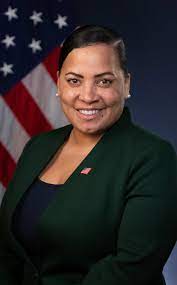Massachusetts U.S. Attorney, Rachael Rollins, will step down after a Justice Department inspector general investigation into her involvement in a political fundraiser and other ethics-related matters. Although the report has not been released yet, Rollins’ attorney confirmed that she will be sending a resignation letter to President Joe Biden by the end of business on Friday.
The resignation of a U.S. attorney due to ethical concerns is an incredibly rare occurrence, particularly during a time when the Justice Department, led by Attorney General Merrick Garland, is focused on restoring normalcy and promoting good governance after several tumultuous years.
Rachael Rollins’ attorney acknowledged that she has been privileged to serve as a U.S. attorney and take pride in the accomplishments of her office. However, recognizing that her continued presence has become a distraction, Rollins has made the difficult decision to resign. Attorney Michael Bromwich, a former Justice Department inspector general, stated that Rollins intends to address any lingering questions once she has stepped down and the situation has calmed down.
Rollins, who faced significant controversy, was appointed as Massachusetts’ leading federal law enforcer, necessitating Vice President Kamala Harris to cast tie-breaking votes twice to advance her nomination in the Senate. Republicans vehemently opposed her nomination, portraying her as a radical figure.
Prior to assuming her prominent position as U.S. attorney, Rollins served as the chief prosecutor for Suffolk County, encompassing Boston. During her tenure, she engaged in conflicts with Boston’s largest police union and advocated for liberal criminal justice reforms, notably implementing a policy of non-prosecution for certain minor offenses.
In November, The Associated Press broke the news that the inspector general’s office had initiated an investigation into Rollins regarding her attendance at a Democratic National Committee fundraiser held at a residence in Andover, Massachusetts. According to two individuals familiar with the investigation, who requested anonymity due to lacking authorization to disclose details of the probe, Rollins’ participation in the event, which featured first lady Jill Biden, was the subject of scrutiny.
Individuals familiar with the investigation informed the AP that, during that period, the probe had broadened to encompass additional aspects. These included Rachael Rollins’ utilization of her personal cellphone for official Justice Department matters and a trip she made to California, funded by an external organization.
In a tweet shared in July, Rollins stated that she had received approval to meet the first lady and departed the event early to participate in two community engagements. However, according to an individual with knowledge of the pre-event discussions, Rollins had been granted restricted permission to meet Jill Biden outside the residence.
The U.S. Office of Special Counsel, another federal watchdog agency, has been conducting its own investigation into whether Rollins’ participation in the fundraiser violated the Hatch Act, a law that imposes restrictions on political engagement by government employees. The current status of this investigation remains unclear.
As part of the probe into Rollins’ potential use of her personal phone for official Justice Department business, the inspector general’s office reportedly acquired the contents of certain employees’ phones within Rollins’ office, as per an individual familiar with the matter who spoke to the AP last year.
Furthermore, investigators scrutinized a trip taken by Rollins to California, which was financed by an external organization. It is against Justice Department guidelines for employees to accept travel payments. The trip in question was related to CAA Amplify, an annual event organized by Creative Artists Agency, one of Hollywood’s leading talent agencies, which brings together entertainment, business, and political figures.
Republican Senator Tom Cotton of Arkansas, a vocal critic of Rollins who had attempted to obstruct her confirmation, had urged the inspector general last year to investigate whether Rollins’ actions as U.S. attorney violated the Hatch Act.
In a letter addressed to Inspector General Michael Horowitz earlier this month, Cotton stated that a recent “whistleblower” had made allegations that Rollins had been actively removing a significant number of documents from the U.S. attorney’s office, even after being instructed by the Department of Justice leadership to cease such actions.
Rollins’ attorney dismissed the allegation as baseless, describing it as “complete nonsense.” Additionally, the attorney suggested that Senator Cotton would benefit from familiarizing himself with the realities of managing a law enforcement agency and combating crime in major cities rather than engaging in unfounded accusations.
by: Big Sky Headlines Staff

